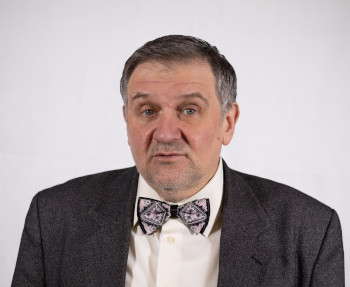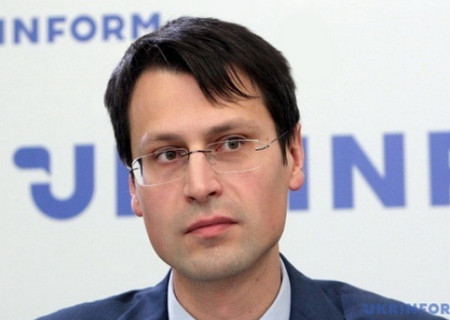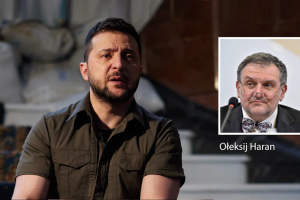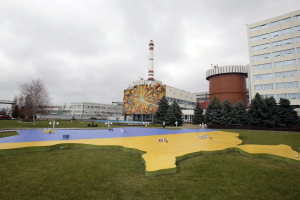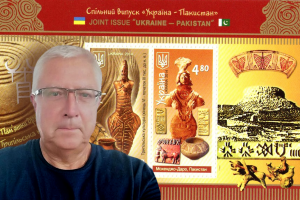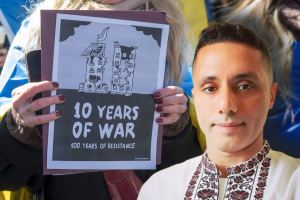Will Ukraine’s 2019 Elections Be a Turning Point? Unlikely, but Dangers Lurk
PONARS Eurasia Policy Memo No. 552
November 2018
Policy Memo
(PONARS Policy Memo) Next year, amid an ongoing conflict with Russia, sluggish economic recovery, and the rise of populism, Ukrainians will elect a new president (in March) and a new parliament (in October). Although the Ukrainian public is fragmented in its support of the six or seven frontrunners and parties, the outcome of both elections is not likely to bring radical change to Kyiv’s foreign and security policies—unless Russia decides to intervene, with or without violence. Ukrainians may be wary about Russian-backed activities, such as fostering a divisive referendum about conflict resolution in the Donbas or stirring up tensions between the government and ethnic minorities or Moscow patriarchate zealots. The country’s Western partners should not downplay the Kremlin’s potential interventions, nor should they overreact to any new configurations of Ukrainian political power. Perhaps the most important imperative for both Ukrainians and the West is to continue pushing for the separation of oligarchs from the levers of governance. Although much can change over the next five months, the current outlook is that political developments in 2019 are not expected to produce another major turning point in the colorful history of Ukraine.
Poroshenko’s Legacy: Baking “Kyiv Cake” for Others?
We argued in 2014 that three major challenges would define the course of President Petro Poroshenko’s presidency.[1] First, he had to avoid actions that would lead to full-scale war with Russia or rampant civil war. Due to international support and a high level of engagement on the part of Ukrainian civil society, Poroshenko managed to mitigate these threats. The two most popular policy tools that emerged for resolving the conflict in the east are international sanctions against Russia and the implantation of a UN peacekeeping mission. Although both instruments are permanent topics of Poroshenko’s diplomatic and public activities, they are currently beyond his power as deliverables.
The president’s foreign policies, as a whole, can be evaluated as quite successful, but he owes many of his achievements (and failures) to external power brokers. For their part, major presidential hopefuls, like Yulia Tymoshenko, Anatoliy Hrytsenko, and Yuriy Boyko, have similarly stuck to passive approaches. All of them proposed different conflict resolution plans that have one important similarity with Poroshenko’s: they rely on hypothetical decisions made by major foreign powers. While Tymoshenko and Hrytsenko make appeals to the UN Security Council and the signatories of the Budapest Memorandum, Boyko tends to repeat Russian narratives about fully implementing the Minsk agreements and holding direct talks with the separatists. In fact, they all use different elements of Poroshenko’s opportunistic past policies in their attempts to attract voters.
If nothing changes in the conflict zone, any new Ukrainian president will follow the path forged by Poroshenko, which essentially means avoiding confrontation with Russia and strengthening ties with the EU and, over time, NATO members. Even a hypothetical pro-Russian winner would not be able to reverse Ukraine’s current course since it would require control over an absolute parliamentary majority, which was a rare phenomenon even in pre-war Ukraine.
Second, Poroshenko has had to maneuver between the rigid demands of external creditors (predominantly the IMF and the EU) and the interests of oligarchs who seek to secure their sources of rent, which are dependent on captured state institutions and assets. In reality, any international requirements for progress require economic reforms and an improvement in domestic market competitiveness, which Poroshenko has brought up in his selective struggle with the oligarchs. Those who challenged the president’s power, like Dnipropetrovsk tycoon Ihor Kolomoyskyi or gas magnate Dmytro Firtash, were squeezed out of profitable state contracts and lost control over lucrative state companies. At the same time, strongmen who accepted Poroshenko’s political domination, like Donetsk shadow kingmaker Rinat Akhmetov, improved their market standing despite the economic recession and even profited from new pricing mechanisms on the domestic energy market.
On the regional level, Poroshenko awarded his loyalists and allies with gubernatorial offices and respective influence over regional markets, thereby re-establishing a system of political patronage over regional economic processes that existed before 2014. For instance, spheres of influence in the Donetsk region were divided between his old vassal, Pavlo Zhebrivskyi, and a group of MPs (who were former business subordinates of Viktor Yanukovych); the important cities of Odessa and Kharkiv remained controlled by feuding, local strongmen, many with criminal histories, who agreed to share power with Poroshenko loyalists; and the capital, Kyiv, was divided between Poroshenko’s business companions and a group of supporters behind Mayor Vitaliy Klitschko.
Despite enormous efforts by Poroshenko over the last four years, he did not achieve enough political power to become the state’s supreme arbiter holding all veto power (like Kuchma had in his second term) or the nation’s most powerful oligarch (like Yanukovych tried to be).
All of Poroshenko’s allies and rivals have diversified their political connections, built bridges with opposition figures, and nurtured their own “puppet” contenders for power. For instance, Kolomoyskyi and Akhmetov were successful in lobbying for state budgetary and regulatory support through the office of former Prime Minister Arseniy Yatsenyuk. At the same time, Kolomoyskyi occasionally supported Mikheil Saakashvili and Tymoshenko, giving them unlimited access to his media outlets. Akhmetov also remained one of the main sponsors of the pro-Russian Opposition Bloc and entered into close cooperation with Oleh Liashko, the leader of the populist Radical party. Thus, even after the Euromaidan, the main candidates, except former defense minister Hrytsenko, maintained working relations with major oligarchic groups and would use their resources during campaigns. Even if the presidential office is won by a non-conformist, oligarchs will try to keep a decisive presence in the parliament. As a result, the changes in the security and defense policies of Ukraine would be constrained by big business interests, which favor peace over war and compromises over any kind of confrontation.
It should be acknowledged that there was a decline in the well-being of the majority of Ukrainians over the last four years, which has helped fuel the rise of populist and nationalist radicals and increased the possibility of violent protests. According to a DIF poll in May 2018, 62 percent of Ukrainians refuse to bear the burden of reforms due to their dire welfare or lack of trust toward the process of implementing them. If Poroshenko’s government fails to keep social security obligations or misses the early warnings of another economic downturn, then presidential and parliamentary elections may fall toward populist contenders like Tymoshenko, Liashko, or Zelenskyi, or non-conformists like Hrytsenko. In that case, foreign and defense decisionmaking would become more unpredictable or even outright hostile toward Russia (Hrytsenko).
Regarding the third challenge, as Olexiy Haran and Oleksii Sydorchuk wrote several years ago, Poroshenko should have reconstructed stronger presidential powers (for his own benefit and for the benefit of the country at the time) using the available parliamentary majority and created a system of constructive cooperation, if not subordination.[2] However, while trying to restore post-Yanukovych-executive power, Poroshenko disregarded several accountability conditions.
In the beginning, he demonstrated a willingness to adopt the demands of the Euromaidan. He launched judicial reforms, a process for purging judges and prosecutors, and established an independent, anti-corruption body. During the implementation of these critical policies, Poroshenko proved to be an adept political operator, even a master of intrigue, and he began to use legal loopholes to install his appointments. Poroshenko spent two years engaging with civil groups on anti-corruption campaigns. At one point he was assisted in this by the charismatic Mikheil Saakashvili who helped him remove political rival Yatsenyuk from office and install Volodymyr Groysman, a more loyal prime minister, who, in the end, started to play his own political games. After this, the president began to turn a blind eye toward the demands of both civil society actors and progressive politicians, especially when it came to eradicating corruption, protecting civil activists against selective assaults by law enforcement or organized crime, and obstructing justice when it involved people from his own entourage.
Poroshenko tried to concentrate power in his hands but his double standards and half-completed decisions and reforms began to deeply frustrate his supporters, Ukraine’s Western partners, and his own former political allies. His pyramid of power was founded on him being the central figure in distributing awards and punishments, an assumption that gave him the best chances to get re-elected. By 2018, confidence in the president was seriously shaken. According to a DIF opinion poll conducted in August 2018, Poroshenko descended to a position of sharing second place with other contenders who do not have his power pyramid or track record of achievements. His relative descent has forced elites—in Kyiv and in the regions—to look for alternative political patrons. This means that whether Poroshenko or another candidate wins next year, operative control of executive power will have to be rebuilt, and time and effort invested into establishing a parliamentary support base. This would make it almost impossible for Ukraine to engage in any kind of quality international talks and tasks before the spring of 2020.
Russian Meddling: Business as Usual
The meager progress in political and economic reforms in Ukraine after the Euromaidan revolution is one of the reasons the country remains vulnerable to the tools of Russian influence. Through outright military force, clandestine operations, propaganda, and/or disinformation instruments, the Kremlin will most probably try to destabilize and weaken Ukraine between now and the two elections next year. Moscow’s long-term goal is to restore its influence from inside the Ukrainian political sphere, a position it lost due to the assorted results of the Euromaidan. During the last session of this year’s Valdai Club, President Vladimir Putin clearly stated that he wanted to establish working relations with the new Ukrainian leadership after the 2019 election cycle. In 2015, we postulated that the most cost-efficient and less risky way for Moscow to get Ukraine back under its control is to support pro-Russian political forces in Ukraine in order to win elections.[3] Changes that have happened in the Ukrainian political environment in the last three years very well may inspire Russian efforts to re-vitalize this option.
Despite the ongoing war in Donbas and the Crimean annexation, many Ukrainians do not consider Russia responsible for the conflict. Although polls show around 20 percent of the population supports the Russian political agenda, the majority of people with pro-Russian sentiments in areas currently under Ukrainian control are concentrated in several southern and eastern regions such as Kharkiv and Odessa, making them perfect and susceptible targets for Russian meddling between now and the elections in 2019.
A recent DIF poll indicates that pro-Russian political leaders such as Yuriy Boyko (Opposition Bloc) and Vadym Rabinovich (For Life; formerly an Opposition Bloc deputy) currently share second and third places with Poroshenko (while Tymoshenko is in first place). In addition, the survey shows that pro-Russian young politician Evheniy Muraiev has been highlighted (by the people) as a potential, desirable leader, along with patriotic popular rock singer Sviatoslav Vakarchuk and comedian Volodymyr Zelenskyi. Objectively, the various pro-Russian politicians have little chances of winning the presidential race. However, they could use their campaigns to mobilize voters in the parliamentary elections and even form factions that are strong enough to participate in coalition talks.
The risk is that there have been strong, early warnings that Russia would use these (and any) pro-Russian forces as Trojan horses to re-enter and alter Ukrainian politics. Moscow’s main message to Ukrainian voters would most probably be that only rapprochement with Russia—returning to “normal” political and economic relations with Russia—can bring peace to the Donbas, as well as a significant improvement of the economy and social welfare. Also, it is possible that Russia will employ rudimentary tactics such as supporting former members of Ukraine’s communist and socialist parties to attack the government from the left.
In addition to restoring direct channels of political influence, Russia has continued to be active in aiding a number of pro-Russian media outlets with content and in extending their reach. For example, under the theme of “free media” and “protection of free speech,” Russia is spreading anti-Kyiv-government propaganda through the likes of Strana.ua (Internet) and Vesti (print press). Major pro-Russian politicians like Opposition Bloc co-sponsor Serhiy Liovochkin or head of the political board of For Life Viktor Medvedchuk, also use their control over popular TV channels such as Inter, NewsOne, and 112 to promote their policies while sharing Kremlin messaging.
It is also clear that Russia will not refrain from covert and violent activities such as assassination and sabotage to try to destroy Ukrainian public trust in its government. Two plots, the Savchenko and Babchenko cases, which were disrupted by the Ukrainian counterintelligence services in the beginning of 2018, revealed that the probable goals of these planned-but-failed assassinations were to instigate public fury against the government, provoke calls for political resignations, and spark a movement for early elections. Other cases involve non-Russian ethnic minorities. For example, according to Ukrainian security service reports, there were assaults against Hungarian minority organizations in Transcarpathia—acts of sabotage to provoke tensions between ethnic Ukrainians and ethnic minority representatives.
Our main expectation is that Russia will not miss an opportunity to intervene in Ukraine’s unfolding election cycle. Using social dissatisfaction against former revolutionaries in the government and disappointment with politicians’ broken promises, pro-Russian political forces may gain support—up to 20 percent of the votes, in our current estimation. While this will not be enough to form a government and/or change Ukraine’s policies, it will give the Kremlin certain rights, such as institutionalized legal lobbying and appeals to the public interest that it can say it represents, to limit the policy choices of Ukraine’s future president and cabinet. In turn, this would have a direct effect on the resolution of the war in Donbas and any moves toward Ukraine’s further integration with the EU and, potentially, NATO.
Conclusions
Despite visible domestic tensions and the ongoing war in Donbas, the elections of 2019 should not hit as another crisis in Ukrainian modern history. The majority of people do not demand a complete restoration of the pre-war situation. Rather they seek a more consistent and decisive implementation of the Euromaidan demands. Since Ukrainians consider that the biggest obstacles to reforms are the bureaucracy (39 percent) and the oligarchs (39 percent), they will eye leaders who are trusted and capable of diminishing these two barriers to good governance.
Even though populist leaders could conceivably garner wins in 2019, it is doubtful that voters will buy into rhetoric of strengthening the role of the state unless there is rampant warfare in the east or a severe economic crisis. After all, relatively more Ukrainians think that the government should focus on guaranteeing fair rules across society while they focus on trying to achieve better day-to-day lives for themselves. Moreover, dire economic conditions and necessity to secure Western financial and military support forces any president-elect to begin his or her term by correcting the mistakes of the current president and government. Among the most urgent of steps: cutting oligarchs off of state support and strengthening defenses against Russian military incursions. Any alternative would mean rejection of Western ties in favor of preserving a system of oligarchic shadows ruling the country, which will result in the eventual returning of Ukraine to Russia’s sphere of influence.
In all these respects, during the electoral cycle of 2019, it would be wise for Washington and Brussels to postpone making policy demands on the current Ukrainian authorities that might serve to divide the nation or place it under deep economic austerity. Most importantly, the United States and the EU should work with Kyiv to prevent the Kremlin from fostering harsh divides among citizens, an example of which would be pushing for a so-called referendum on peace resolution plans, since, at present, there is no such option that would unite the country.
Olexiy Haran is Professor of Political Science at the Kyiv-Mohyla Academy and Research Director at the Democratic Initiatives Foundation.
Petro Burkovsky is Head of the Center for Advanced Russia Studies at the National Institute for Strategic Studies (Kyiv).
[PDF]
[1] Olexiy Haran and Petro Burkovsky, “The Poroshenko Phenomenon: Elections and Challenges Ahead,” PONARS Eurasia Policy Memo No. 336, August 2014.
[2] Olexiy Haran and Oleksii Sydorchuk, “Ukraine’s New Government: Possibility of Progress or Another Pre-Term Election in Sight?,” PONARS Eurasia Policy Memo No. 436, August 2016.
[3] Olexiy Haran and Petro Burkovsky, “From ‘Hybrid War’ to ‘Hybrid Peace’: One More ‘Frozen Conflict’?,” PONARS Eurasia Policy Memo No. 369, July 2015.

